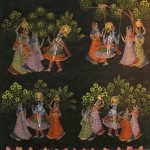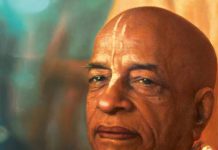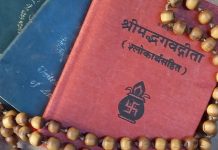Around kindergarten or so, my parents started insisting I pray with them, but I refused, adorably saying, “But I don’t know all the Spanish words!”
Of course, Muslims pray in Arabic, not Spanish. Islamic prayer involves repeated recitations of Qur’anic verses, always in Arabic. Much the way Jewish kids grow up learning to read and recite Hebrew but not understand or speak it, Muslim kids are taught to read and recite Arabic without actually learning the language.
So my parents sent me next door to an old man, a neighbor who lived in the adjacent Rindge Avenue tower in Cambridge where I grew up. He was going to teach me to read and recite Arabic (but not actually learn the language). My resistance was immediate and intense, even as a five-year- old. They already had me praying by then, although I didn’t know the words so I just stood, bowed and kneeled when everyone else did.
The apartment smelled terrible – the musty stink of curry and spices from halfway around the world. The old man—his name escapes me now—had a peculiar odor too. He was bearded and wore all white to broadcast his holiness. We began with the alphabet and he would angrily shout at us when we made a mistake. My parents weren’t able to drag me there for too many more visits because after just a few weeks, I threw horrible tantrums to avoid sitting beside that dreadful old brute.
Eventually, my parents enrolled me in a proper Islamic Sunday school where the training continued. As I got older, the pressure to learn and practice became even more intense. Cut to last year, when I began speaking out against Islam on this blog, and my family was predictably furious. When I told them that I resented being forced to practice Islam, my father angrily shouted, “There is no compulsion in Islam!” The phrase spat from his lips as if automated, deeply lodged in his brain from his own prior programming in religion. Yes, Muslim apologists love to cite this phrase, borrowed vaguely from the Qur’an, that ‘there is no compulsion in Islam.’ But I shot right back that this assertion was a total lie. How could I—as a kindergartener—have objected to my parents demands that I pray with my father, that I learn Arabic, that I attend Sunday sch ool? I was never given a choice in the matter. Even if there was the veil of choice, every child wants to please his parents in order to gain their approval. So to suggest that I freely chose to practice Islam and that I was not compelled by my elders is simply a lie.
In Sunday school, I asked my teachers impossible questions that they did their best to ignore. The foremost question in my mind was: why did we have to learn the word of God in Arabic? If God really did send down a message to humanity to guide us—which I was ready to believe—then why not send the message in every language? Or why not make the message universal enough for people of all cultures to understand? And besides, even if God did choose to make a revelation in a specific langua ge, why should we get attached to that language? Surely, it’s the message that matters and not the language it was revealed in, right?
As an adult now, I can see that the answer to this question is that Islam is essentially an Arab pride movement.
While central authorities in the Muslim world since the caliphate on to the current Saudi monarchy have done their best to obscure the actual origins and history of Islam, astute observation reveals that Islam is an amalgamation of Abrahamic and Arab pagan traditions. Reading the Qur’an in chronological order reveals a politically savvy prophet borrowing the mythologies of the Jews & Christians and combining them with the rituals and practices of the Arab pagans. There are certainly original rituals and mythologies that are unique to Islam, but the melting pot nature of Islam cannot be denied. In contrast, modern Muslims often pride themselves in the uniqueness of Islam, and it’s complete rejection of pre-Islamic paganism, a time referred to as the age of ignorance. And yet, historical study shows that the pilgrimage to the Kaa’ba, the fast and feast of Ramadan, the shahada, and even the crescent star symbol have pre-Islamic origins, to name a few.
Muhammad’s genius was in concocting a melange of acceptable doctrines, stori es and rites that the warring tribes of Arabia would find palatable enough to accept. Now, personally, I don’t think there’s anything wrong with admitting that Islam is an evolution of earlier religious traditions, but Muslims would howl blasphemy at my assertion that they share common spiritual heritage with pagans. But if the Christians can acknowledge their evolution from Judaism, then surely Muslims must come to grips with the origin of their faith, as well.
Bound together by religion, the warring tribes of Arabia were now united in a new cultural identity. The era of Arabian dominance began, as they conquered Asia and Europe, spreading Islam peacefully through merchants & missionaries and by force through soldiers & swords. The rise of the Arabs meant increased trading and yes, that did lead to some peaceful conversions to Islam. But Islam was also spread by the sword and this history is well-documented, particularly in India. The Islamic empire stretched as far West as Spain until the Crusades.
The Arabian empire wasn’t all swords and bloodshed, though. They were largely responsible for the recovery of the classic Greek texts, the discovery of algebra, the beginnings of chemistry, etc. But again, while Muslims are quick to take credit for such scientific advancements—particularly while Europe languished in ruins—even these advancements were largely linked to the traditions of Arab sorcery and paganism. For example, chemistry evolved from the Arab sorcerers who practiced a lchemy.
Even today, a narrative is emerging in India that points to the Arab invasions as hobbling Indian development, rather than the later British invasions. Arabs invaded the Indian sub-continent and determined that the polytheist, pantheist and pluralist traditions thriving in Southeast Asia needed to be subordinate to the obvious superiority of Islam. Islamic governance severely sabotaged that part of the world from keeping up with the progress that the West has enjoyed. We can see now that countries mired in Islamic history—be they the Arab nations in the Middle East or the Asian nations in the Far East—are decidedly behind on every measurable metric. In the Muslim world, the explanation for this discrepancy in development is the notion that the West—and specifically the white man—is responsible for stealing from the darker-skinned nations through colonialism. While that’s certainly a big part of the equation, the resentment aimed at the West by Muslims is often an excuse to avoid admitting their own responsibility for their fate.
Thanks to Arab expansion, Muslims now are composed of many different ethnic backgrounds from African to Asian and even European. So you might think that the Arabs are a welcoming, tolerant people accepting of their fellow Muslims with darker skin. But you would be wrong. The racist elitism among Arab Muslims toward African Muslims or Indian Muslims is quite startling. Growing up, I imagined a sense of unity among these various Islamic tribes, but no suc h unity exists. The secular civil wars among varying sects of Islam clearly illustrate the lack of brotherhood.
So I had to wonder as a kid: the Christians aren’t trying to learn Aramaic in Sunday school, why are we forced to learn Arabic? If a non-Arab wants to convert to Islam, why must they learn Arabic to properly perform their Muslim duties? If the religion was truly meant to be universal, than such linguistic trappings would be counterproductive.
Only recently did it strike me that ultimately, the doctrines of Islam are not really ab out universality. Instead, Islam is essentially an Arab pride movement aimed at codifying and preserving Arabic culture. Particularly as modernity challenges the tenets of Islam, Arabian culture clings to Islam as a signifier of status.
As a Bengali, it wounds me to think of the thousands of years of spiritual development wiped out by the Arab invasion of the Indian subcontinent. Not all Bengalis are Muslims, but those who are take pride in their religion and view their own religious heritage—the rich Bengali/Indian traditions that predate Islam—as disgusting. As a Bengali-American exploring my ancestry, this self-hatred of pre-Islamic Bengali culture strikes me as a curious kind of cultural Stockholm Syndrome. The Arab invasion was so successful t hat Bengalis are cursing their own ancestors’ spiritual traditions in favor of an essentially Arabian cultural movement. The pre-Islamic days of the Indian subcontinent offered a rich variety of spiritual traditions from non-dualist Buddhism, to pantheist Hinduism, and even some forms of monotheism. These traditions are much, much older than Islam and when studied carefully, they are much more nuanced and spiritually powerful.
Take yoga, for example. Yoga is a rich and varied tradition in Hindu culture that is deeply entwined with religion and spirituality. In the West, we have appropriated yoga—separating it from religion and distilling it to just an exercise routine. Now, this distillation may be offensive to some devout Hindus, but I must say, t o me, it seems like a validation of the practice’s efficacy. Yoga and meditation are both examples of religious traditions that are literally thousands of years old—even more ancient than Christianity—that are being practiced by secular individuals in America who are receiving physical and spiritual benefit from their practices. Islam, by contrast, offers no such contribution. Can you imagine western businessmen doing the movements of Islamic prayer for the health benefits? Of course not. On substance, Islam does not seem to offer the same ancillary benefits as other secularized religious practices. And yet, meditation and yoga are spreading through the West like wildfire.
In exploring my Bengali heritage, I felt short-changed by my Muslim up bringing. If I was to trust my family, it was as if my ancestors were feral dogs who had been civilized by the wonderful Arabs who brought them the miracle of Islam. But when I studied history, religion and culture for myself, I saw the truth: Bengalis had developed much deeper spiritual philosophies, practices and systems long before the first Arabs set foot on their shores. The Indian subcontinent of my ancestors was regal, powerful and flourishing. The society left in the wake of the Muslim expansion pales in comparison. The Indian subcontinent now suffers in abject poverty. Most people like to blame the British, but a closer reading of history locates the decline of the Indian subcontinent earlier, brought on by the imposition of Islamic rule.
And this pat tern repeats. Islamic rule devastates nation after nation with only a few exceptions that prove the rule. For every Indonesia, there are ten Sudans.
Ultimately, I rejected Islam on theological grounds. The tenets of Islam simply do not align with my God-given conscience. But in my development, I was deeply upset to discover that Islam was a late addition to my cultural inheritance. Before Islam, a parade of genius spiritual sages roamed Bangladesh and India articulating concepts of the most profound beauty. Radical non-violence. Unconditional love. Infinite compassion. The oneness that pervades and unites all. These concepts are universal, nuanced, tolerant and deeply profound in a way that Islamic theology simply is not. Islam, conjured by the Arabs, is a rec ent innovation compared to the rich tapestry of time-tested profound spiritual wisdom that existed in my motherland long before Muhammad was born.
When I began reading the works of the great South-Asian spiritual masters, my rage at my family was renewed. Why had I not been initiated into this rich cultural tradition sooner? Why was I introduced to these spiritual thinkers by New Age yuppies in yoga class? Why was I being forced to study Arabic in kindergarten when my own Bengali ancestors had discovered far deeper spiritual truths? Why was my family trying so desperately to reach the standard of Arabian Islam when their own cultural heritage was so much more powerful, so much more relevant to modern life, and so much older? I felt profoundly ripped off. It wa s a shame that I was left to discover such geniuses later in life, and that for my entire youth I had been force-fed the tales of Muhammad and his companions, stories that required mental acrobatics to accept as true.
The answer is that Islam condemns paganism and polytheism without fully understanding what those spiritual traditions actually are. And the people conquered by the Arabs, forced to adopt their new religion, inevitably adopted their prejudices too. So now, Bengali Muslims loathe their own ancestry, their own spiritual inheritance.
So, when I say that Islam is an Arabic pride movement, I say so based on my own experience. If the teachings described in the Qur’an and expanded upon by the Hadith resonated with me on a spiritual level, perhaps I wouldn’t mind. But the profound cultural amnesia of my family deeply saddens me. In the end, I hope my parents can at least accept that I have not rejected Islam for secular hedonism, but for the much older spiritual traditions of our own enlightened ancestors.











